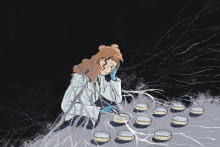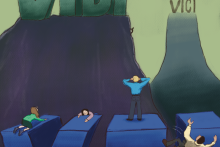Until one morning just before Christmas, the stem cells had behaved in an exemplary manner. HELA cells proliferate, so to speak, as soon as they end up in a petri dish. That's what cancer cells are for. Stem cells, on the other hand, are real divas. The premature cells, which can still change into any type of cell, get lost at the slightest thing, explains PhD candidate Lena Koch. ‘The medium you use, the slightest fluctuation in temperature, even the change of seasons can have an impact,’ says Koch. ‘You need a lot of patience to work with them.’
Harvest moment
around half past nine o'clock that morning, the PhD candidate put her cells under the microscope. For ten weeks, she had cultivated them into neurons with great care and attention. The next day would be the 'harvest moment', the end of the experiment, the day she could write down all the data she so desperately needed. Shortly after Christmas, she wanted to share her results in a request for a conference presentation.
She immediately saw that something was wrong. 'I saw a yeast infection in my control sample. It looks like a kind of network of tree branches, there was no doubt about it. You can't solve that, as with a leaking biochip, with some tape. All the late nights, all the weekend work you've spent taking care of the cells, had all been for nothing.’
She took a picture with her mobile phone and threw the dish in the trash.
High pressure to perform
It sounds horrible and it is, but if you aspire to a scientific career in stem cell technology, you'd better get used to it. After completing her master's degree in biomedical sciences in Münster, Koch was keen to do interesting research. She had already done an internship in Twente, so when she found out that a PhD position was available, she decided to give it a try.' I applied because the subject was so new and interesting. I saw the PhD more as a kind of side effect. That may have been a bit naïve, because the pressure is high, there are a lot of deadlines and sometimes you just don't have the mental strength to deal with them. Sometimes everything becomes too much. Then I wonder if I would have advised my twenty-year-old self in retrospect to look for a research job elsewhere.'
'It can be very difficult to admit that not everything is going as planned, because the pressure to perform in this world is very high.'
Imposter syndrome
Although many PhD candidates will recognize this, many are reluctant to talk about it openly to a journalist. Koch, who is about to complete her PhD, understands this. 'It can be very difficult to admit that not everything is going as planned, because the pressure to perform in this world is very high. You need to build a good resume, publish articles, and achieve certain goals. As a PhD candidate, you also have to win scholarships abroad. You put a lot of pressure on yourself and your environment does the same. As a result, it can be difficult to be honest about what is not going well.'
This may also have something to do with the meticulous character that many scientists have, according to Koch. 'You have to have a certain degree of perfectionism for this work, but many people are very critical of themselves. Many, including me, struggle with imposter syndrome. Even people who are brilliant. You feel like it's never enough, that you always have to prove yourself. If anything goes wrong, there's always the fear that you don't belong here.'
The competition for money and resources does not help. This can sometimes take cruel forms, says Koch. 'Some department heads deliberately feed the competition in their group. In Münster, it happened that two PhD students were hired for the same position. Whoever reached a certain milestone first was allowed to continue. The other had to find something else. This competition means that researchers become a kind of islands and do not easily reach out to colleagues.'
Encouragement
Fortunately, Koch has nothing to complain about her own supervisor. After that particular morning of the fungal disaster, she actually gave her a boost. 'She offered her condolences, because after so many months of caring for stem cells, you get attached to them, as it were. I can also talk to her about personal things. I think it's very important to see the person behind the PhD candidate, because personal circumstances can have a big effect on the research. In other groups, the importance of compassion and understanding is often underestimated.'
Competition can be a good motivator, Koch thinks, but only if it stays within limits. 'If it promotes negative behaviour, researchers may feel uncomfortable addressing others who are working in the same direction. While you are more likely to solve many problems by working together and sharing ideas.'
'It would have been very helpful if someone had published about things that don't work. So that you don't grit your teeth on it for months or years.'
Learning from each other
Ideally, Koch would like to see researchers also structurally share their setbacks. Not only to blow off steam, but especially to learn from each other. 'You never read about the negative outcomes of experiments. Sometimes you're struggling with something and then someone says, oh yes, you tried this, but it doesn't work for this reason. Then it would have been very helpful if someone had published about things that don't work. So that you don't grit your teeth on it for months or years. As a PhD candidate, you don't have all the time in the world.'
'You never read about the negative outcomes of experiments.'
After her PhD, Koch will immediately start a postdoc research. Although she still sometimes wonders whether the choice for a PhD was the right one, the answer is in the affirmative. 'You also get a lot in return. You can make a positive contribution to the healing of a disease, attend conferences, meet all kinds of different people. Moreover, you will learn a lot about yourself. I have learned to be patient, to have more compassion for myself and for others. Sometimes things don't go well, but there's always a second chance.'




